Everything to Know About the Houston Astros' Cheating Scandal of 2017
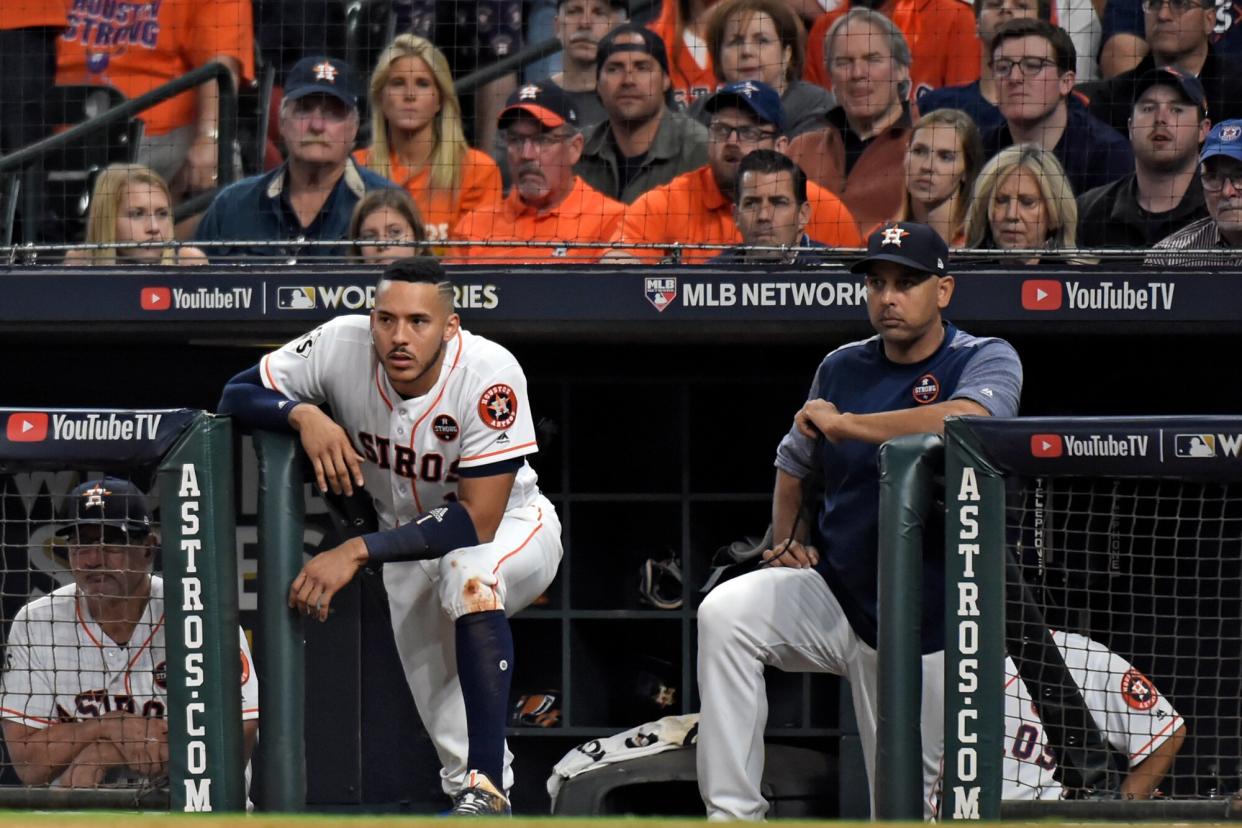
LG Patterson/MLB via Getty
Here's a look back at one of baseball's biggest foul plays in the history of the game.
The Houston Astros just solidified a spot in the 2022 World Series, marking the third time they've made it to the annual championships of Major League Baseball since their controversial win against the Los Angeles Dodgers in 2017.
It wasn't just their nabbing of the Commissioner's Trophy that still has baseball fans unsettled to this day, but it was their unfair gameplay throughout the entire 2017 season (and parts of the 2018 season) that put their integrity in question.
So what did the Astros do that notoriously disturbed America's favorite pastime? Simply put, they used a camera to illegally steal signs from opposing teams at home games. Players and staff devised a scheme to decode catchers' signs and communicate to their team what pitch to expect.
Although the strategy of sign stealing wasn't against the official MLB rules, it was their use of technological aid that was a game violation. Even after the professional sports organization issued a statement to further clarify the rules, the team continued the wrongdoing.
Ahead of the Houston Astros' best-of-seven playoff against the Philadelphia Phillies in the 2022 World Series, here's everything to know about the sign stealing controversy in 2017.
RELATED: Former Houston Astros Player Claims Team Cheated by Using Camera to Steal Signs During 2017 Season
What is sign stealing in Major League Baseball?
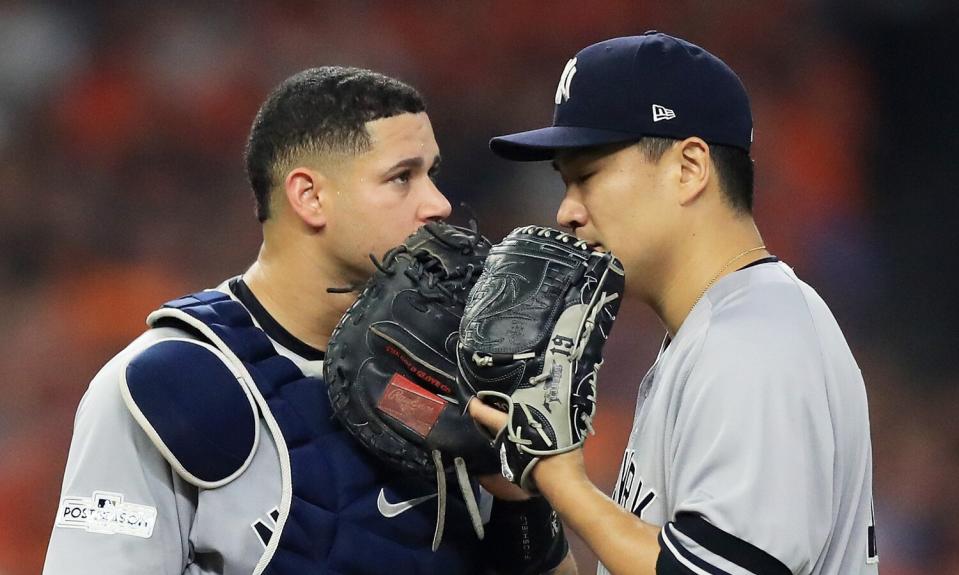
Ronald Martinez/Getty
Sign stealing has been a part of the game of baseball for years. It's considered an observational loophole that doesn't technically go against official baseball rules. That is unless technology is involved.
According to The New York Times, sign stealing is considered "something of an art form in baseball, and is tolerated, even admired." Although the strategy dates back to the 1870s, technology-involved sign stealing dates back to the 1959 MLB All-Star Game when NBC introduced its new 80-inch camera lens and positioned it at center field.
The clear images fascinated broadcasters Mel Allen and Phil Rizzuto, particularly when the close-up zoom captured the catcher calling pitches in advance with the use of specific finger signs. "One finger, [Associated Press] explained, called for a fastball; two fingers, a curve; wiggling all fingers, a change of pace. They were always right," noted Sports Illustrated.
While there was nothing wrong with the age-old sign stealing strategy, Commissioner Ford Frick had a hunch that the advanced center field camera would create an opportunity for future foul play — therefore, he banned networks from using it.
Frick was commissioner until 1965 and passed away in 1978, so he never got to see the impeccable, advanced sports technology that came to be in the years that followed — particularly for broadcast purposes — but his hunch was correct. Cameras would create opportunities for cheating, and the Houston Astros took advantage of that in 2017.
RELATED: Who Is Alex Bregman's Wife? All About Reagan Bregman
How did the Houston Astros cheat in 2017?
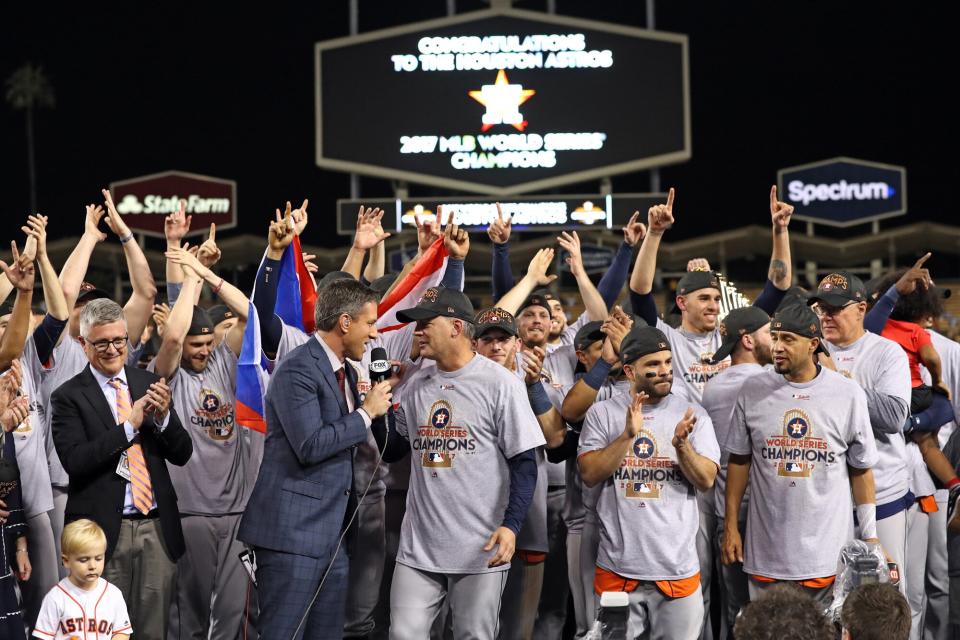
Alex Trautwig/MLB via Getty
The MLB introduced a video "replay review" rule called the "Manager Challenge" during the 2014 season. It gave managers one challenge to start the game and allowed them to challenge two times in total provided the first challenge resulted in an overturned call, according to the organization's official glossary.
Each team has a video replay review room, of which MLB investigators said that the Astros used a center field camera fixed on the opposing team's catcher to steal his signals. In November 2019, former Astros player Mike Fiers disclosed details to The Athletic, exposing the team's sign stealing culture.
The camera feed "was hooked up to a television monitor that was placed on a wall steps from the team's home dugout at Minute Maid Park, in the tunnel that runs between the dugout and the clubhouse," the sports publication — that was acquired by The New York Times in 2022 — reported.
The team's staff and players would sit in front of the monitor and attempt to decode the signals on the screen. When the spectators believed they had the pitch figured out, they would communicate the pitch via banging on a trash can in the tunnel. "Normally, the bangs would mean a breaking ball or offspeed pitch was coming," The Athletic noted.
RELATED: Ted Cruz Comments on Being Booed and Flipped Off at Yankee Stadium: 'You Gotta Expect That'
How did the Houston Astros get caught cheating in 2017?
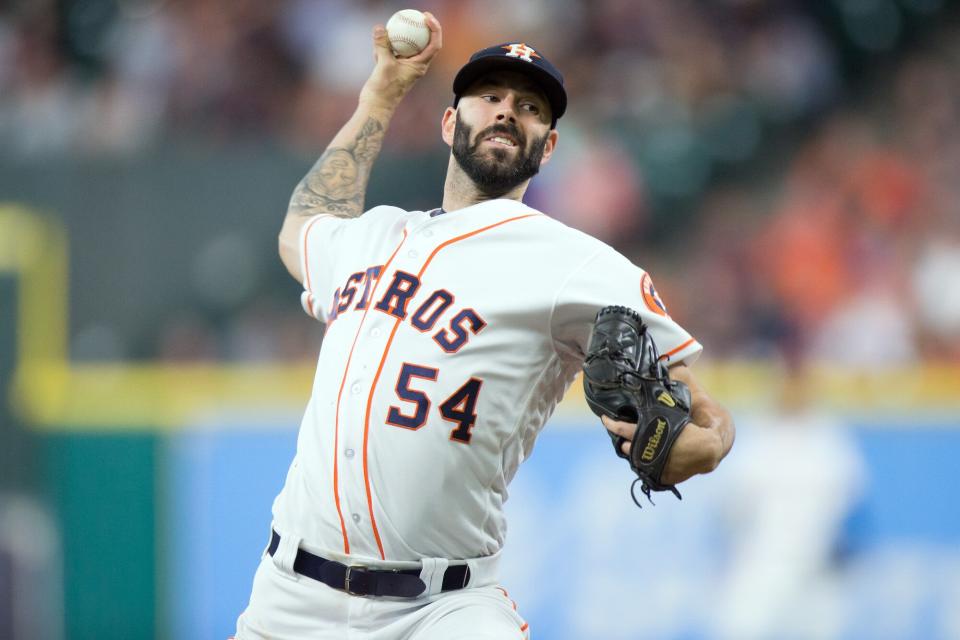
Juan DeLeon/Icon Sportswire via Getty
Fiers opened up to The Athletic in 2019 about the Houston Astros' alleged cheating. But why would the athlete expose his former team?
Aside from already having a "strained relationship" with Astros, Fiers wanted "the game to be cleaned up a little bit because there are guys who are losing their jobs because they're going in there not knowing," the then-free agent told the publication at the time.
Furthermore, he alerted the teams he was on to prepare them ahead of playing the Astros at Minute Maid Park (the team's home ballpark). "They were advanced and willing to go above and beyond to win," he said of Houston's team.
After Fiers' claims were published in The Atlantic, the MLB decided to conduct its own investigation that spanned from 2016 to 2020. The Department of Investigation interviewed 68 witnesses, including 23 current and former Astros players. Plus, tens of thousands of text messages, videos, emails and photographs were collected for review.
RELATED: Simone Biles and Fiancé Jonathan Owens Root for Houston Astros on Opening Day
Which games did the Houston Astros' cheat on?
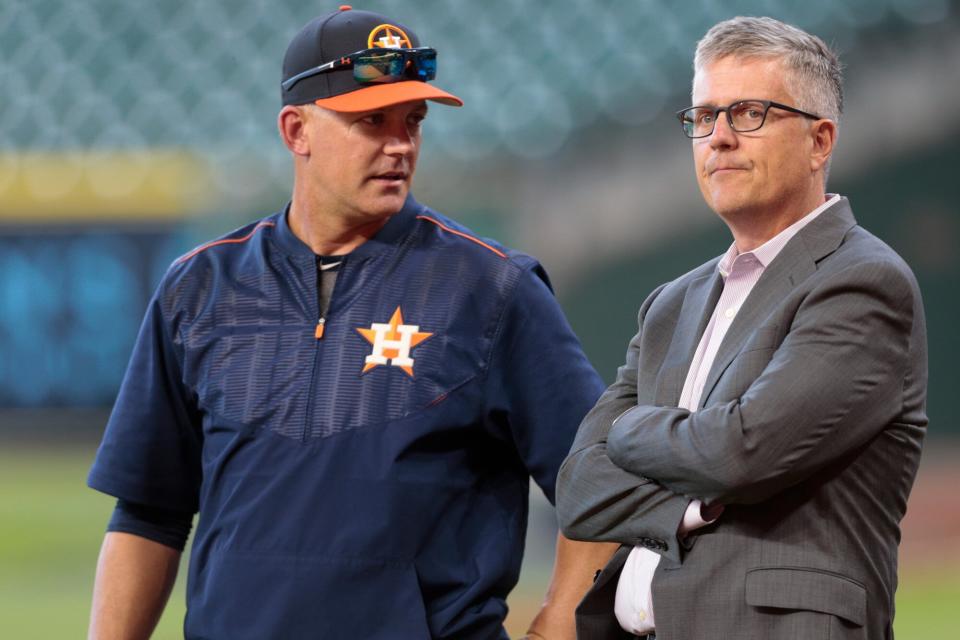
Bob Levey/Getty
The Houston Astros' camera-cheating strategy dates back to the start of the 2017 season (yes, the season they won the World Series) when they would assign a "runner" to relay the information from the video replay room to the dugout who would notify the players of the catcher's signals.
Early in the season, then-Astros' Bench Coach Alex Cora "began to call the replay review room on the replay phone to obtain the sign information," reads the MLB's complete investigation report. Sometimes the sign-sequence information would be communicated via text messages sent to the cell phones and smartwatches of staff members on the bench.
RELATED: Houston Astro's Alex Bregman's 7-Week-Old Son Knox Enjoys First Baseball Game: 'He Loved It'

LG Patterson/MLB via Getty
Two months later, the team improved their sign stealing system when Cora had a monitor displaying the center field camera feed arranged immediately outside of the Astros' dugout. This was when the trash can-banging scheme was enacted. Both the players' use of the monitor in the dugout and the employees' decoding in the replay review room continued throughout the 2017 season.
Note that the Boston Red Sox and New York Yankees were caught using the replay review room inappropriately in August 2017, prompting Commissioner Robert D. Manfred, Jr. to issue a press release prohibiting the use of electronic equipment during games to steal signs — but the Astros continued their tactic in the regular season, throughout the postseason and at the beginning of the 2018 season.
Who was involved in the Houston Astros' cheating scandal?
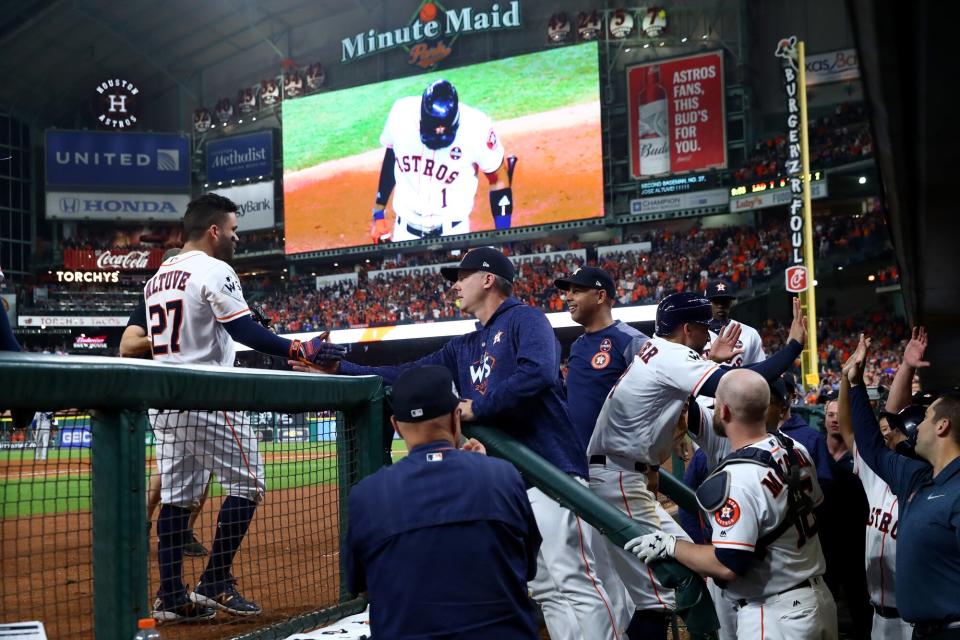
Christian Petersen/Getty
The 2017 Houston Astros players were the majority involved in the cheating scandal, as they were either recipients of the decoded signals or the distributors of the signs by banging on the trash cans. Bench Coach Cora was also largely involved, as he helped devise both schemes.
As for the Astros' general manager, Jeff Luhnow, zero evidence proves his involvement or knowledge of the banging scheme or the decoding efforts in the replay room. Despite his admittance of being unaware of the rule violations, Commissioner Manfred held him "personally accountable for the conduct of his Club."
The same went for Field Manager A.J. Hinch, as well as Astros Owner and Chairman Jim Crane.
RELATED: MLBPA and MLB Reach Agreement, Season Will Move Forward After Delay
What consequences did the Houston Astros face after cheating?
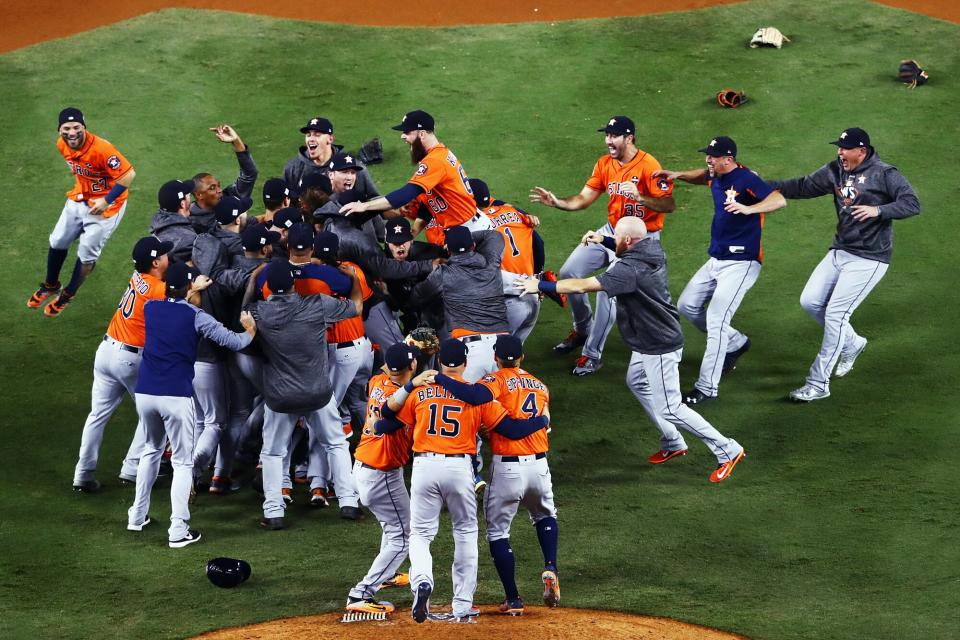
Tim Bradbury/Getty
Having learned of the Astros' conduct during the 2017 season postseason and at the beginning of the 2018 season, many fans, players, MLB Club executives and press questioned the integrity of the games in which the Houston team participated. The Astros faced the consequences as a result, both the team as a whole and the players individually.
Several of the team's picks from the 2020 and 2021 First-Year Player Drafts were docked, the MLB fined the club $5 million and Astros Manager A.J. Hinch and General Manager Jeff Luhnow were fired in January 2020, per the NYT.


